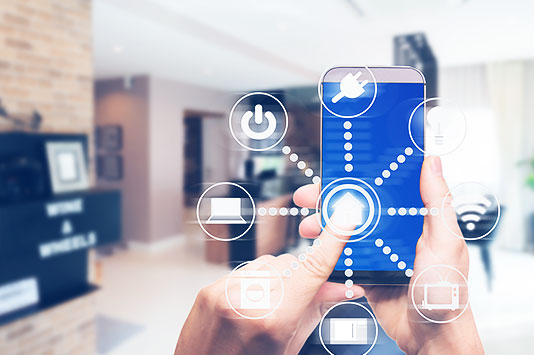
The IoT is the idea of connecting any electronic device to the internet to create a network of “things”. It came from the concept that technology would be more effective if it can sense its surroundings. Connecting sensors together creates information for each object and potential action based on a wider set of information. These things can range from retail devices, such as fridges, coffeemakers to FitBits, lighting and entertainment systems, but also has commercial application in pressure, movement, and heat sensors in warehouse, plant equipment or packaging, for example. Linking these things together over a network (the internet) has amazing potential for streamlining and improving how we live and work. For instance, there are now fridges that can reorder groceries when they run low and alarm clocks that notify kitchen appliances when to make a morning brew, as well as pressure sensors to tell a valve to close and prevent flooding a house if there is a leak.
The potential for innovation is enormous: American technology research firm, Gartner, has estimated that there will be more than 26 billion connected devices by 2020. This means that the IoT will have a direct impact on everyone’s lives. While that impact can be positive in many ways, there are potential risks of which you should be aware. As an industry, we are only beginning to understand the impact of IoT and how to benefit and also to protect ourselves and our clients.
The insurance industry has already begun to incorporate the IoT into the sector, with many insurance providers using “black boxes” or even smartphones to track vehicle use and driving behaviour for car insurance, known as telematics. The devices sense and record their surroundings (acceleration, location, orientation) to detect sharp braking, cornering, distraction, driving times and speed. This can allow you to better understand your driving and where you can be safer and also allow insurance companies to reward you for good driving and thus lower likelihood of crashing and making a claim.
There are a number of other ways in which the insurance industry is looking into integrating the IoT into the market, such as using fitness and health trackers to personalise supporting your wellness, as well as motivating you to be healthier and reduce the cost of claims on the health insurance, which puts pressure on your premium.
However, there are potentially some ethical issues with this technology advancement that need to be considered, such as how the information gathered is used. As a consumer you should verify with the appropriate provider their position before sharing your data. For any industry where you are providing data to a wider unknown network make sure it is protected, secured and only used for the appropriate reasons. For instance, if you are sharing your data with your health insurer make sure they are using it for reasons to motivate and help reward you for good practice, rather than to penalise you for poor practices.
As well as how the information is used the development of connected devices in the IoT has brought with it concerns about breaches of security. This can be in you sharing data with someone that you are unaware off as they have breached a device with poor security, as is sometimes the case with retail products who are focused on speed and cost in market rather than security, or increasing your exposure to hacking or ransomware through people taking control over your own personal networks.
If your home was integrated over your own wifi network and the internet with some of the products available on the market today this offers more attack points, should someone want to hack you, leaving you open to ransom. It is possible that someone could breach your network via an insecure IoT device, as it was cheap and not updated, and then place a ransomware programme that locked you out for the network by changing your password and then adding software which changed the settings (such as turning on all the lights at 2am every night,) until you paid them to stop, or you spent a fortune to replace every device affected. This example could equally be a commercial situation where corporate networks and devices are involved.
The IoT offers potential value, but being aware of these risks and balancing them with the selective use and efforts to protect where they are used is essential. Education is a big part of mitigating the risk and as consumers become more aware of the issue, the market will be forced to evolve and improve how it protects the users. It is crucial that if you are investing in integrated technology that you invest time into researching these products and reading reviews to ensure that you are purchasing ones which are resistant to cyberattacks.
A recent State of ICT survey, conducted in December 2016, found that 100 per cent of Bermuda residents believe in the importance of protecting personal information and 98 per cent of residents would prefer doing business with organisations that protect their personal information. At Argus we take the protection and confidentiality of our clients’ data very seriously and invest heavily in steps to protect it However not all companies act with the same diligence. It is therefore important to read through the terms and conditions of agreements when engaging with a new company or product. Be cautious when connecting a device or sharing your data to register one on the internet.
The Internet of Things promises to revolutionise the way in which we live our lives, to make us more efficient, healthier and safer. But it is also possible for technology to outpace our understanding of the risk and it is important that we take the time to stop and think about what it is that we are risking. I would urge you to embrace new technology but to make sure that you educate yourself, because when it comes to protecting yourself and your personal data, education is key.
 Sign In
Sign In







